I've noticed lately that Hollywood seems to go ga-ga for certain roles in movies that are severely lacking. With the Oscars coming up in a week, this year is certainly no exception, one actress even picking up a nomination for the aforementioned severly lacking role. It's not that these actors are bad in any way, it's just that they're getting kudos for the wrong reasons. Below are recent performances by three actresses that fell victim to wasted roles but skated through so the blind media could congratulate them for a job well done.... if there was even much of a job to begin with. Is this just another example of awards season campaigning gone horribly awry?
Catherine Keener in Capote (2005):  To see her practically carry Being John Malkovich (2001) with her acid dialogue is to watch a great performance. She's reliably good in most of what I've seen her in, even quite charming and disarmingly sexy in The 40 Year Old Virgin (2005). Hell, I even thought she flexed her comedic muscle quite well opposite the likes of Robin Williams in Death to Smoochy (2002), a brave movie in the vein of low-culture dark comedy, a subgenre we get too little of. She was just fine in Capote, too, but there was nothing for her to do. She gets the the award for most wasted role of the year. She was scenery. Reviews are calling her the "moral conscience" of the film. What does that mean exactly? I didn't see how her performance directly affected any of the other characters in the movie, I didn't see what her character did to motivate action in the screenplay. I'm baffled why she's accrued so much attention. I understand that sometimes when a movie is so high-profile in the awards circuit, sometimes it will sweep up surrounding awards that aren't exactly inspired (uh, Best Editing Oscar nom for Ray (2004)? wtf), so this may be the case with Keener. The most recent issue of Entertainment Weekly quotes an anonymous Oscar-voting actor who claims he will be voting for Catherine Keener because "She was the thing that gave Capote its energy," and "She was almost more important to the film than [Philip Seymour Hoffman]." Did this guy even see the movie? I don't know who he's talking about then. Catherine Keener was subtle to the point of disappearance (not a good thing), lacking any spark or punch that made her role stand out. Some would argue this is the point though.... but to what end? She had nothing to do in the movie except sort of tag along. Where is her scene? Even the likes of Beatrice Straight (in Network (1976)) and Judi Dench (in Shakespeare in Love (1998)) can win Best Supporting Actress Oscars for around six minutes of total screentime, because they own the scenes they're in. Meanwhile, Catherine Keener walks off with an undeserved Oscar nomination this year, and snub-ee Thandie Newton (in the Straight/Dench camp) will just have to be happy with her BAFTA honors instead of the Oscar nomination she deserves.
To see her practically carry Being John Malkovich (2001) with her acid dialogue is to watch a great performance. She's reliably good in most of what I've seen her in, even quite charming and disarmingly sexy in The 40 Year Old Virgin (2005). Hell, I even thought she flexed her comedic muscle quite well opposite the likes of Robin Williams in Death to Smoochy (2002), a brave movie in the vein of low-culture dark comedy, a subgenre we get too little of. She was just fine in Capote, too, but there was nothing for her to do. She gets the the award for most wasted role of the year. She was scenery. Reviews are calling her the "moral conscience" of the film. What does that mean exactly? I didn't see how her performance directly affected any of the other characters in the movie, I didn't see what her character did to motivate action in the screenplay. I'm baffled why she's accrued so much attention. I understand that sometimes when a movie is so high-profile in the awards circuit, sometimes it will sweep up surrounding awards that aren't exactly inspired (uh, Best Editing Oscar nom for Ray (2004)? wtf), so this may be the case with Keener. The most recent issue of Entertainment Weekly quotes an anonymous Oscar-voting actor who claims he will be voting for Catherine Keener because "She was the thing that gave Capote its energy," and "She was almost more important to the film than [Philip Seymour Hoffman]." Did this guy even see the movie? I don't know who he's talking about then. Catherine Keener was subtle to the point of disappearance (not a good thing), lacking any spark or punch that made her role stand out. Some would argue this is the point though.... but to what end? She had nothing to do in the movie except sort of tag along. Where is her scene? Even the likes of Beatrice Straight (in Network (1976)) and Judi Dench (in Shakespeare in Love (1998)) can win Best Supporting Actress Oscars for around six minutes of total screentime, because they own the scenes they're in. Meanwhile, Catherine Keener walks off with an undeserved Oscar nomination this year, and snub-ee Thandie Newton (in the Straight/Dench camp) will just have to be happy with her BAFTA honors instead of the Oscar nomination she deserves.
Scarlett Johansson in Match Point (2005): 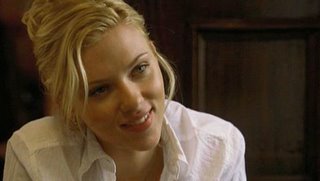 If I have to hear people refer to this movie as "The return of Woody Allen!" or "The best of Woody Allen!" I'm going to spontaneously combust. Either idiotic reviewers missed Woody Allen's other film in the same year (Melinda and Melinda (2005)), or they are just blinded by the fact that Woody Allen can actually write dramatic screenplays. Too bad this one was so shoddy. A lot of the film's initial intrigue came out of Scarlett Johansson just being sexy like she is. No longer jail bait (she was 17 years old in Lost in Translation (2003)), this movie was supposed to be a steamy love affair with Scarlett at the center, a vehicle to show us the dark nature of human love and show us what a powerhouse we know Scarlett to be. After all, she seemed to be headed in the right direction as far as awards attention is concerned, picking herself up a Golden Globe nomination. The problem? She doesn't do anything in the movie. Her character is practically dropped by the midpoint, only to be ressurrected as someone for the protagonist (?) to use, and then she gets used and then unceremoniously written out of the script. Watching this, I thought I had missed something. We get so much potential from her at the beginning.... she exudes sexual tension and brings a nice energy to the first half of the movie. Unfortunately, her actions as a character do nothing to change the course of the movie, or the protagonist (?) for that matter. She becomes a dead weight, whose only option is to be unceremoniously written out. A waste.
If I have to hear people refer to this movie as "The return of Woody Allen!" or "The best of Woody Allen!" I'm going to spontaneously combust. Either idiotic reviewers missed Woody Allen's other film in the same year (Melinda and Melinda (2005)), or they are just blinded by the fact that Woody Allen can actually write dramatic screenplays. Too bad this one was so shoddy. A lot of the film's initial intrigue came out of Scarlett Johansson just being sexy like she is. No longer jail bait (she was 17 years old in Lost in Translation (2003)), this movie was supposed to be a steamy love affair with Scarlett at the center, a vehicle to show us the dark nature of human love and show us what a powerhouse we know Scarlett to be. After all, she seemed to be headed in the right direction as far as awards attention is concerned, picking herself up a Golden Globe nomination. The problem? She doesn't do anything in the movie. Her character is practically dropped by the midpoint, only to be ressurrected as someone for the protagonist (?) to use, and then she gets used and then unceremoniously written out of the script. Watching this, I thought I had missed something. We get so much potential from her at the beginning.... she exudes sexual tension and brings a nice energy to the first half of the movie. Unfortunately, her actions as a character do nothing to change the course of the movie, or the protagonist (?) for that matter. She becomes a dead weight, whose only option is to be unceremoniously written out. A waste.
Laura Linney in Mystic River (2003): 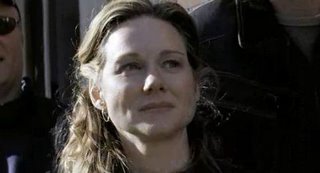 Her underwhelming ten minutes of screentime were topped off by an unearned grand-standing speech at the tail end of the movie. Reviews and awards steam screamed "Brilliant!" and "Lady MacBeth!" when I thought, "Wasted role!" and "Over the top!" I feel that Mystic River is perhaps one of the most overappreciated movies in recent history, full of sloppy direction, hammy acting, and (worst of all) an overcrowded screenplay. Laura Linney is really a great actress (I haven't yet seen The Squid and the Whale (2005), but she proved her worth to me in Kinsey (2004) and You Can Count on Me (2000)).... her performance in Mystic River wasn't bad, it just wasn't much of anything. The character was given practically no time to develop on screen, and then she's suddenly given this wicked and high-energy speech at the end of the film. Had her character been more of a presence, her speech would have lent to a phenomenal and twisted ending; what turned out was a top-heavy pontification from a character we don't know and therefore did not earn this weight in the film. The role was severely underwritten and just revealed another gaping hole in the script. (Thankfully, Marcia Gay Harden earned an Oscar nomination for the film instead, probably the only deserving acting honors the film earned.... even against Sean Penn and Tim Robbins.)
Her underwhelming ten minutes of screentime were topped off by an unearned grand-standing speech at the tail end of the movie. Reviews and awards steam screamed "Brilliant!" and "Lady MacBeth!" when I thought, "Wasted role!" and "Over the top!" I feel that Mystic River is perhaps one of the most overappreciated movies in recent history, full of sloppy direction, hammy acting, and (worst of all) an overcrowded screenplay. Laura Linney is really a great actress (I haven't yet seen The Squid and the Whale (2005), but she proved her worth to me in Kinsey (2004) and You Can Count on Me (2000)).... her performance in Mystic River wasn't bad, it just wasn't much of anything. The character was given practically no time to develop on screen, and then she's suddenly given this wicked and high-energy speech at the end of the film. Had her character been more of a presence, her speech would have lent to a phenomenal and twisted ending; what turned out was a top-heavy pontification from a character we don't know and therefore did not earn this weight in the film. The role was severely underwritten and just revealed another gaping hole in the script. (Thankfully, Marcia Gay Harden earned an Oscar nomination for the film instead, probably the only deserving acting honors the film earned.... even against Sean Penn and Tim Robbins.)
Now I pose some questions. Why do roles like these seem to pick up so much attention? Am I missing something? Who else has had their acting talents unjustly bled dry?
Saturday, February 25, 2006
wasted roles and the great actresses that play them
pondered by
is that so wrong?
at
2:19 PM
2
comments
![]()
Tuesday, February 21, 2006
Winter Olympics 2006: who needs rules? bring on the danger!
I've loved watching the Olympics since I can remember ever seeing them, and I like that they alternate between summer and winter games every two years instead of both together every four years. Sure, there's definitely the feeling of international intrigue involved.... the whole world is watching, after all. The winter Olympics are my favorite, I think, because the sports all have a higher degree of speed. Spectators get rattles and airhorns. There's more room for wilcard antics, too, and that's what ultimately makes some good television.
Sports can be dangerous.... Olympic sports even more so. Maybe it's something from the gladiator rule book, a way to test the true Olympian in the athlete. Unless we happen to be on the sidelines of whatever event is going on in Turin this year, we all watch the Olympics on TV. We watch so we can root on for our home country or whoever else we prefer. We watch because we want to see a little bit of catastrophe, too. It's kind of like a weird collision of reality television and traditional sporting events. I'm not in it to see people get hurt, but if the favored athlete takes a nasty spill and the underdog leaps to the podium with an unexpected gold medal, I'm stoked. This kind of intrigue, this unexpected plot twist (if you will) is what makes good television all around, and the Olympics are no exception.
Because most of the events involve speed and similar athletic technical tricks, the Olympics can be a little monotonous. Every bobsled race, luge race, alpine downhill ski race, speed skating race, and figure skating competition can all be fairly uninteresting because fundamentallly they're all the same. Isn't it more fun when someone breaks the mold? More often than not the mold is broken when someone screws up.... but can we all agree that we're guilty of being glued to the screen when we see catastrophe? When that favored downhill skier wipes out halfway down the course? When that figure skater tries their triple salchow and lands on their ass? When the bobsled flips over and flies down the ice chute upside down? 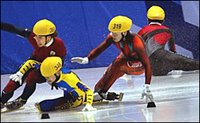 At the 2002 Winter Olympics in Salt Lake City, another bland speed skating race was suddenly turned very fast-paced when one skater wiped out and took out the three favored leaders. To see them all careening into the sidelines and the slow one in the back leap forward is a crazy turn of events.... and that's what made an awesome race. Sure it may not be fair, but it's the potential nature of the sport on a short track, and somehow we know this in the back of our minds when we tune in.
At the 2002 Winter Olympics in Salt Lake City, another bland speed skating race was suddenly turned very fast-paced when one skater wiped out and took out the three favored leaders. To see them all careening into the sidelines and the slow one in the back leap forward is a crazy turn of events.... and that's what made an awesome race. Sure it may not be fair, but it's the potential nature of the sport on a short track, and somehow we know this in the back of our minds when we tune in.
I imagine the reason why the events are discussed by hypercritical, negative, and sometimes rather irritating commentators is because we want to know when someone is screwing up. This breaks up the monotony, however miniscule the differences are. If we can't see it, then I guess we have to hear about nitpick by nitpick. It's similar to a writing workshop, actually, except the atheletes are spared hearing the commentators talk about how much they suck.
I think the reason why figure skating is the most popular winter Olympic sport is because of its unpredictability, in comparison to the other events. Sure, it is beautiful to watch too, and other sports don't have this kind of artistry to them. Just to watch these people take on those jumps and spins and lifts are enough to tempt accident. Everyone who competes is so good at what they do that the performances kind of bleed togther. I'm not sure how to tell the differences between all the jumps they can do, but the point is that everybody does all of them. Why not let the daredevils really defy death for us on the ice? Freestyle skiing is a lot of fun to watch.... how those skiers fly in the air with 720° turns and flips, grabbing their skis and diving to the ground with a triumphant wham is beyond me. It's the kind of sport that I guess has to be done right the first time; there isn't much room for error. So, if skiers are allowed to have two entire events (moguls and aerials) to the credit of freestyle daredevil antics, why not figure skaters? The backflip is deemed illegal by the figure skating judges, for some reason or another.... not graceful enough? Too dangerous?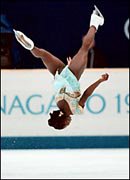 At the 1998 Winter Olympics in Nagano, Japan, French figure skater Surya Bonaly was nearing the end of a calamitous final program. She started missing jumps and losing speed on her spins, and there was no way she could make it into medal contention. This was her second or even third Olympics, and after this program she would be going professional anyway.... so she gave a wide smile, winked, and flew in the air with a backflip and landed on one foot. She's probably the only person in the world who can do that. From there on out, she didn't care about the medals; she was giving a performance. The crowd was at their feet, the irritating commentators were stunned, and Surya Bonaly ended her program with her arms out to the audience and her back to the judges. I saw it all live on TV. Now that is the reason why I watch the Olympics.
At the 1998 Winter Olympics in Nagano, Japan, French figure skater Surya Bonaly was nearing the end of a calamitous final program. She started missing jumps and losing speed on her spins, and there was no way she could make it into medal contention. This was her second or even third Olympics, and after this program she would be going professional anyway.... so she gave a wide smile, winked, and flew in the air with a backflip and landed on one foot. She's probably the only person in the world who can do that. From there on out, she didn't care about the medals; she was giving a performance. The crowd was at their feet, the irritating commentators were stunned, and Surya Bonaly ended her program with her arms out to the audience and her back to the judges. I saw it all live on TV. Now that is the reason why I watch the Olympics.
pondered by
is that so wrong?
at
9:47 PM
1 comments
![]()
Friday, February 17, 2006
the death of voice talent
With recent animated films like Curious George (2006) out in theatres, it is abundantly clear that Hollywood has lost its respect for voice talent. Why bother actually searching for talented voice actors when you can simply plug a marquee name on the poster? Children could care less who voices the characters as long as the film is entertaining. Hollywood is hoping to persuade anyone and everyone who wouldn't normally see an animated film like Curious George to fork out the cash just because they haven't gotten enough of Will Ferrell yet. Meanwhile, hundreds of voice actors across the country are thrown into the street, collecting unemployment.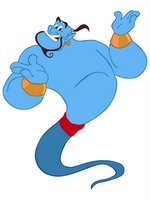 I think this trend started with Aladdin (1992), by casting Robin Williams as the voice of the Genie. This was an inspired piece of casting because Robin Williams is 1) a talented voice actor, 2) not a bad singer, and 3) a comedic genius. Aladdin was wildly successful, probably one of Disney's most successful films ever (I don't wanna bother looking up statistics on that one), and I quite enjoy it. Because Aladdin was so successful, movie studios decided to pull this trick again and again, with less impressive results each time. Since then, popular actors have been bleeding their way into animated films, at an alarming rate. You know you've seen that behind-the-scenes footage of them without makeup and wearing sweatpants in front of a microphone in a recording room. You're supposed to think: "They actually do voices in cartoons too?! I must go see this movie!"
I think this trend started with Aladdin (1992), by casting Robin Williams as the voice of the Genie. This was an inspired piece of casting because Robin Williams is 1) a talented voice actor, 2) not a bad singer, and 3) a comedic genius. Aladdin was wildly successful, probably one of Disney's most successful films ever (I don't wanna bother looking up statistics on that one), and I quite enjoy it. Because Aladdin was so successful, movie studios decided to pull this trick again and again, with less impressive results each time. Since then, popular actors have been bleeding their way into animated films, at an alarming rate. You know you've seen that behind-the-scenes footage of them without makeup and wearing sweatpants in front of a microphone in a recording room. You're supposed to think: "They actually do voices in cartoons too?! I must go see this movie!"
I'm not saying that the quality of animated films has diminished because of this (for instance Wallace & Gromit, veteran of the animated short film circuit, finally deserves its mainstream exposure for all to enjoy). I do think, though, that's it's terrible that talented voice actors aren't being respected because they don't have that marquee name. Why have we reached a point that animated films must be sold by the names featured in it? Who really goes to see a cartoon because of the famous actor voicing a role? Recent movies like Shrek and a A Shark Tale and the neverending stream of other inside-jokey meta-script cartoons have gone overboard (Mike Myers and maybe Eddie Murphy can pass because of their voice talents.... but Cameron Diaz? Why her and not some other actress?). Today, I dare you to find an animated film that doesn't carry a popular actor in its cast (except for Wallace & Gromit, mentioned already). You'd have to start chipping away at more obscure cartoons to get to the good stuff.
I'm not saying that screen actors with familiar faces don't make good voice actors either, because that's simply not the case. But, there are actors that specialize in voices who are likely passed over because they're not recognizable. Shouldn't that be the point, though? When we watch animation, we're not watching acting, we're hearing it. The voice should be the seller. Sometimes voice actors don't have the film "look", and that's exactly why they specialize in voice, because that's what they're good at and can be employed for. Voice acting is a completely different beast than stage or film acting, and now it seems to almost be a dying art.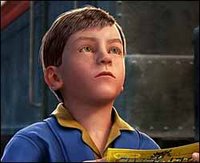 This brings to mind that idea of "image capture" animation, with Tom Hanks wearing that funny virtual reality shooting-practice suit so he can play x number of creepy dead-eyed characters in The Polar Express (2004). Andy Serkis got the same job, sort of, playing Gollum in The Lord of the Rings and the title ape in King Kong (2005). This furthers the disintegration of voice acting as a specialty by merging live acting with animation: are we really seeing these films because of Hanks and Serkis? I imagine we could care less, considering we can't actually see them through the computer magic.
This brings to mind that idea of "image capture" animation, with Tom Hanks wearing that funny virtual reality shooting-practice suit so he can play x number of creepy dead-eyed characters in The Polar Express (2004). Andy Serkis got the same job, sort of, playing Gollum in The Lord of the Rings and the title ape in King Kong (2005). This furthers the disintegration of voice acting as a specialty by merging live acting with animation: are we really seeing these films because of Hanks and Serkis? I imagine we could care less, considering we can't actually see them through the computer magic.
I think voice acting has a little bit more longevity in television, before it gets gobbled up as it has in film. "The Simpsons", for instance, is a phenomenal example of voice acting at its best. They've got a fairly small cast, each voicing a variety of characters. Their voices are icons of pop culture, and much of the humor and love for the show comes from their voices before the animation. When the cast got together and threatened not to renew their contracts because they wanted raises a few years ago, Fox actually considered letting them go. Now, I'm not a fan of actors getting uppity and demanding outlandish sums for their work (Dear the Cast of "Friends": You all suck. Demanding $2 million an episode? What can you do with $50 million a year that you can't with $5 million? You all seemed to be getting by just fine when you were hired at base pay. All of you can go to hell.), but you can't have "The Simpsons" without the voices of the Simpsons! The thought that Fox considered actually recasting them is outlandish and careless and unappreciative of their talent. This would have never been a thought if they were live actors, like the sucky cast of "Friends" for instance. (Side note: "Simpsons" essential Hank Azaria seems to have made a rare crossover from voice acting to noticeable exposure in non-animated film and television.)
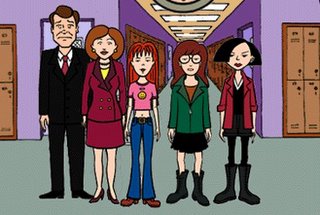
Another paragon of brilliant voice acting: "Daria". This show was so on target, and I give full credit to the phenomenal talent of the actors behind the character's voices. Each character had a distinct personality to the point of subtle comic perfection, and the show is worth rewatching to observe how they all speak. Just like "The Simpsons", the characters of "Daria" express their personalities and neuroses in the slightly turned-up mayhem of their unique voices.... imagine Marge Simpson's gravelly nagging, Homer's girlish giggle.... the list goes on and on, because they're all brilliant. In "Daria", Daria's sister Quinn and Quinn's friend Sandi are hilarious because of their simple disdain, all in the voice. It says quite a lot when an actor only has his or her voice to distinguish them. When you remember back to the best of animated comedy (drama too, to some extent), what do you remember most? The lines that were drawn, or the lines that were spoken?
pondered by
is that so wrong?
at
10:49 PM
2
comments
![]()
Friday, February 10, 2006
Arrested Development sees the writing on the wall
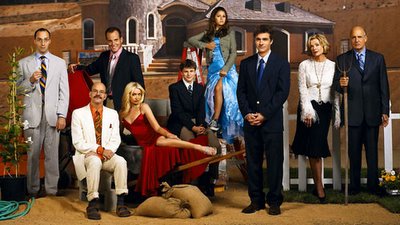 Tonight marked the "season" finale of "Arrested Development", arguably one of the best shows on television. The show has struggled in ratings during its three seasons, and it looks like there is no future for it. I know many people that watch it and adore it, and I've had some great conversations on how well-written it is, let alone the clever and unique quality of humor in the writing. This is a brilliant and hilarious comedy, pushing (yet having a lot of fun with) the boundaries of what characters can say on primetime television.
Tonight marked the "season" finale of "Arrested Development", arguably one of the best shows on television. The show has struggled in ratings during its three seasons, and it looks like there is no future for it. I know many people that watch it and adore it, and I've had some great conversations on how well-written it is, let alone the clever and unique quality of humor in the writing. This is a brilliant and hilarious comedy, pushing (yet having a lot of fun with) the boundaries of what characters can say on primetime television.
It never found its audience, though.... at least not the huge audience Fox had hoped for it. Fox seemed rather squeamish about giving the show a third season to begin with, and this squeamishness turned into a harbinger of death after they slashed its episode order from 22 to 13 in mid-production. Fox didn't exactly try to bolster the ratings, lining up the final four episodes to be played in a row (best to get it all over with at once so it doesn't take up any more space on the schedule, right guys?).... even worse, they played it on a Friday night (a.k.a. ratings graveyard) and against the opening ceremonies of the 2006 Winter Olympics. Real tactful.
It doesn't take much to get me on my soap box about how the best television programming is cut short in the most unceremonious of ways. Once a network decides that the show is over, all support is lost. They shuttle the show around the schedule so that it's impossible to know when it's on. The television awards circuit (a disgusting power play of popularity-contest campaigning only, just a dusty step below the high-glam Oscars) failed to even mention "Arrested Development" this year for much of anything, opting for recycled "Everybody Loves Raymond" tread and genuine overrated crap like "Desperate Housewives" to both sweep happily to the podium for whatever they were up for, again. I tend to think that the reason why a lot of quality television programs are short-lived is because the viewing public isn't smart enough and/or too fickle to follow along and commit. Hence the vapid sitcoms (where does one even start the examples to list?) and unchallenging episodic drama fare (is it just me, or are the relentless spin-offs of "Law & Order"and "CSI" starting to get ridiculous? In five years when we have "Law & Order: Meter Maids" and "CSI: Toledo", I don't want to have to say I told you so).
Like I said before, I know lots of people who watch "Arrested Development" and that it has a very dedicated fan base. Besides that, it's got string critical support across the board. So, is this enough to save a show? How many letters must it take, how many online petitions must one sign? Unfortunately, I don't think that will work. A show rising from the dead is not totally unheard of, though. "Cagney & Lacey" came to being as a mid-season pickup; it was sentenced to death row in the spring of 1983, about half-way through its second season. The show had strong critical support but brought in low rating, which was reason enough for CBS to cancel it, and they did. Despite the low ratings, the show had attracted quite a dedicated viewer base. They had also picked up a handful of Emmy nominations that year (including a win for Tyne Daly) with the writing already on the wall. Thanks to a relentless letter-writing campaign from the loyal viewers and the support of the show's producers, it persuaded the right people at CBS to give it another try. "Cagney & Lacey" came back to life with a seven-episode third season in the spring of 1984. The show remained on the air until 1988 with a total of seven seasons, and spawned at least four made-for-TV movies since then.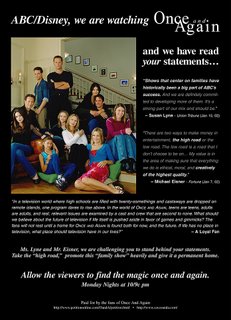 Grassroots campaigns by passionate viewers don't always work, though, and I'm afraid "Cagney & Lacey" may be the lone exception. "Once and Again", a family drama in all the best ways and by far some of the highest quality television ever made, was placed on the chopping block by ABC in its third season in 2002. The same old hallmarks reared their ugly heads: shortened episode order, a tour of obscure openings on the primetime schedule, and a disappearance of awards support (miraculously scraping only one Emmy nomination from its third season, and Susanna Thompson brutally robbed of a supporting actress nomination, passed over in favor of Tyne Daly, coincidentally, and a wheelbarrow-ful of un-surprising "The West Wing" contestants). Fans of the show (myself included) began a campaign to save it from cancellation. We raised enough money to take out three different ads in The Hollywood Reporter (I think one in Variety, too) to point out to those in Hollywood who read them that this show was worth saving. In fact, with ABC trying to tout its desire to produce quality family television (and recovering from the fatal overkill of placing hour-long blocks of "Who Wants to be a Millionaire" in primetime four days a week), the ads that appeared appealed to their wishes. They didn't budge; it was still being canceled. In a final desperate attempt (and with a surge in hardcore fan financing), a billboard was put up across the street from the ABC offices in Los Angeles pleading to give "Once and Again" a longer life. No such luck, and today all we have are the first two seasons on DVD.
Grassroots campaigns by passionate viewers don't always work, though, and I'm afraid "Cagney & Lacey" may be the lone exception. "Once and Again", a family drama in all the best ways and by far some of the highest quality television ever made, was placed on the chopping block by ABC in its third season in 2002. The same old hallmarks reared their ugly heads: shortened episode order, a tour of obscure openings on the primetime schedule, and a disappearance of awards support (miraculously scraping only one Emmy nomination from its third season, and Susanna Thompson brutally robbed of a supporting actress nomination, passed over in favor of Tyne Daly, coincidentally, and a wheelbarrow-ful of un-surprising "The West Wing" contestants). Fans of the show (myself included) began a campaign to save it from cancellation. We raised enough money to take out three different ads in The Hollywood Reporter (I think one in Variety, too) to point out to those in Hollywood who read them that this show was worth saving. In fact, with ABC trying to tout its desire to produce quality family television (and recovering from the fatal overkill of placing hour-long blocks of "Who Wants to be a Millionaire" in primetime four days a week), the ads that appeared appealed to their wishes. They didn't budge; it was still being canceled. In a final desperate attempt (and with a surge in hardcore fan financing), a billboard was put up across the street from the ABC offices in Los Angeles pleading to give "Once and Again" a longer life. No such luck, and today all we have are the first two seasons on DVD.
The last glimmer of hope for "Arrested Development" lies in the reported interest of ABC and Showtime wanting to pick it up. ABC will give it one 13-episode season, but Showtime will give it two. There's no word about what will happen though, because Fox hasn't officially canceled the show, so no deals can be made just yet. All this is Hollywood gossip that you can find for yourself, but I'm crossing my fingers that some of this hope will come to fruition. Is it so much to ask that quality television stay on the air simply because it's quality? Of course, because like all enterprises, the networks must make money, and money and high ratings go hand in hand. How exactly Fox is making money on embarrassingly dismal drek like "The War at Home", though, I'm not sure of.
pondered by
is that so wrong?
at
10:57 PM
2
comments
![]()
Tuesday, February 07, 2006
24: déjà vu
"24" is seven episodes into its fifth season, and it all feels the same. I complain only because I love the show so much, to the point where I cancel arrangements with people to get home in time on Monday nights. All the renewed vigor and "shocking" twists of the season premiere have quickly faded, and we're back to the usual. Jack Bauer continues to torture one-episode guest stars for vital information. If anything, the writers have already set up the show to have its world rocked thanks to last season's cliffhanger, but that cliffhanger was way too neatly wrapped up in the first episode alone, and the ramifications of it are on the backburner or not important at this stage.... they've stacked the deck with unsurprising terrorist scenarios with predictable outcomes. Nothing that they're showing us feels new: we should be getting into the thick of exciting and uncharted territory.
I won't get into a step-by-step analysis of what's going wrong, but instead get to how they're using the same rusty wheel instead of reinventing it. "24" seems to love its chain of bad guys. It's all a complex ladder that the viewer isn't allowed to see. Every season has introduced us to one villain, only for us to learn there is a person over them, and then a person over them, and over them, and so on.... and we have to believe that they're all intricately involved with the events of the day. This device is too much of an easy out; instead of complicating the current villain and making him/her/them interesting and "deep", they usually get killed off and up the ladder we go. There's no payoff with this device, because we learn about these characters and are invested in them, but once we start climbing the ladder of bad guys we never get to see the big picture and then all this info is dropped. (For instance: Nina Myers claimed quite a few interesting connections in Season 1, 2 & 3, but we never got to learn anything about them.... the picture bottom left is an example of this unknown connection, which would have been satisfying in some way, but the producers decided not to air it. The Araz family of Season 4, one member of which at bottom right, was pretty well connected and got a lot of meaty screentime, but the writers lost interest in them too quickly and gave us a boring villain in their place.)
So far, this season is no different. We've got a bad guy with some ill-defined vendetta, and he's got a lot of nerve gas. We've already heard about his superiors, so it's only a matter of time before they show up. In fact, we've already moved up two tiers of bad guys to get to him. [Here's an idea: in the last episode we have the bad guy holding a gun to an innocent metal-cutter, forcing him to cut open tubes of nerve gas to get to some computer inside each. If he cuts too far, the nerve gas is released.... of course that won't happen though, because this bad guy hasn't finished his plan and the inevitable release of the nerve gas is a card the writers want to play later. Why not have the metal-cutter slip, and oops.... nerve gas everywhere!? That would have been a surprise.]
Because every character on "24" is assumed to have a gun, there usually isn't much suspense in terms of people getting shot up. Ah, but this week's episode had a 15-year-old sex trafficking victim snatching a gun out of Jack's holster, thereby the fact that she shot her crusty molester should have been a shock. It was for a moment, until the stench of reused-plot-development surfaced all too quickly. We've seen the bad-guy-with-important-info-is-shot-dead-before-he-can-reveal-it twist a few too many times in this show, and in many other shows too. (Examples: some dude in Season 2 had necessary info but was shot dead, leading Jack to extract a convenient computer chip from his neck. The finale of Season 3 has a one-episode guest star, the wife of a guy killed earlier on, show up and find a gun very quickly and then kill the bad guy before he can reveal his connections. Funny how the unstable characters that turn up in this show all tend to be women.... but that's for another post.)
Some other Season 5 rehash:
* CTU has got some serious security problems with covert operatives gaining high-level positions, especially to keep on chugging happily for five seasons. It's not a good thing when we expect each season to have a mole. It worked for Season 1, but just got silly after that.
* Someone close to the President is in cahootz with terrorists to create a threat that was never supposed to reach American soil! Are we surprised that something goes awry and now American lives are threatened? Uh, this was the idea in Season 2, guys.
* Why is it that whenever someone from CTU has their life upended, it's because of someone from their family and not at work? Just in the last episode, Lynn McGill (played by 2004-Oscar-snubbed Sean Astin) has a junky sister who had her boyfriend beat him up for his wallet. See also Season 2 with Michelle Dessler's cuckoo brother making a scene, and Season 4 with Erin Driscoll's daughter untimely whisking Alberta Watson off the main credited cast.
It can't be that they're simply just running out of ideas! There's so much to work with in this show, but they keep torpedoing their chances to do anything terribly risky and instead play things safe with the same old rulebook. There's a lot of potential with Jean Smart's rockin performance as the First Lady (though, they could cut back on the "she's a wacko!" musical flourish whenever she's on screen). It'd be great to kind of play around with Kim Bauer coming to terms with her dad being back around, and that's evidently on the horizon. It feels like they've boxed themselves into the same old corner, and nothing's sitting on the horizon to move the story along differently than it already has (but maybe this is a sign of something shocking....? Now would be the time to do it, fellas). Some of 24's most entertaining stuff (to me, I guess) comes from storylines somewhat unrelated to the central terrorist crisis.... so I'd like to see them throw something really crazy at us. I know they have it in them, I just don't know why they're not doing it.
 I remember one evening quite a few years ago seeing a commercial for a new episode of "Star Trek: The Next Generation" where Worf and Data and Deanna Troi were on the holodeck acting out a western (the episode, "A Fistful of Datas", heh, is actually not bad). My dad astutely pointed out then that whenever the characters turned to the holodeck, it meant the writers were running out of ideas. He was right, and the memory sticks with me. Now, whenever I imagine the writers of a show running out of ideas, I think of that commercial, and of a Klingon in a cowboy hat.
I remember one evening quite a few years ago seeing a commercial for a new episode of "Star Trek: The Next Generation" where Worf and Data and Deanna Troi were on the holodeck acting out a western (the episode, "A Fistful of Datas", heh, is actually not bad). My dad astutely pointed out then that whenever the characters turned to the holodeck, it meant the writers were running out of ideas. He was right, and the memory sticks with me. Now, whenever I imagine the writers of a show running out of ideas, I think of that commercial, and of a Klingon in a cowboy hat.
pondered by
is that so wrong?
at
10:49 PM
2
comments
![]()
Friday, February 03, 2006
Joyce Carol Oates must be stopped
Joyce Carol Oates is taking the San Francisco literary magazine world by storm. She's had two stories published by Zoetrope: All-Story in the last year and three published by McSweeney's in the last two and a half, two of those being in the last year.
Literary magazines are where a lot of lit-fiction writers (*ahem*, like me) get their start. Those of us who haven't been published (but are seriously on the prowl) at least casually browse through the lit mags to see who's getting published and where. See enough names enough times in any variety of the lit mags, and suddenly you're not so surprised when you see that name on a glossy hardcover a year or so down the road. Pick up a copy of a new writer's first book of short stories and flip to the copyright page: there you will see a litany of references to when and where their stories were first published.
According to whatever paltry research I was able to do online just now, it appears that Joyce Carol Oates had her first book, a collection of short stories, published in 1963. Since then (brace yourself) she's published 39 novels and novellas, 27 story collections, 11 nonfiction works, 8 poetry collections, 8 dramatic collections, 6 young adult and children's books, and a partridge in a pear tree. This doesn't include the 10 or so fiction works published under at least two pen names. She also has edited quite a few anthologies of all kinds, one of which I happen to own. It's been 43 years since this woman burst onto the literary scene; some simple math reveals that she publishes at least 2.3 books a year. This is just the conservative estimate.
Out of her extensive body of work she has gained a National Book Award (out of six nominations!), three finalist slots for the Pulitzer Prize, one finalist slot for the National Book Critics Circle Award, and even a notch on the publish-and-be-independently-wealthy-Valhalla of the Oprah's Book Club bedpost (wait.... maybe this isn't exactly praise?).
Meanwhile, us struggling writers are trying to break out and have just one story be published for the very first time. Across the country, humble slush piles of submissions runneth over. So why exactly, after we submit to Zoetrope or McSweeney’s, say, are we in competition with Joyce Carol Oates to get published? Actually, we’re really not in competition at all; her name is SO well-known that she leap-frogs to the head of the line and gets her story in print with a slamdunk. In 2005 Oates has had four stories published in two literary magazines, but there could have been easily a few others in magazines I haven’t checked. She also had a novel published in 2005, and in 2004, two in 2003, two in 2002, and backward. Remember people, 2.3 a year.
I was lucky enough to read Oates' first foray into sweet-talking the editors at Zoetrope about a year and a half ago, before it was in print. I read it sitting in my Nob Hill laundromat while my clothes were tumbling for all to see in the glass-doored dryer. I was totally unimpressed with what I read. I remember it had the ingredients of what makes something literary (please don’t ask me what makes something literary) but fell absolutely short. It lacked any spark. It was too long. It was kind of boring, (thereby perfect for the New Yorker?). Oates has not gotten this far with shitty writing, but her submission to Zoetrope was lazy. It read like it had flown off her typewriter without a second thought. Had this been in the slush pile by an unknown writer, it more likely would have flown straight into the recycle bin. They published it anyway.
Last weekend a friend of mine made a very funny (if barbed) observation: Oates is fast approaching becoming a genre herself. Her prolific publishing record could very well be soon unfurling into its own section in a bookstore or library. They'd have to ordain her very own Dewey Decimal. I’m not saying prolific publishing is bad by any means, and I certainly wouldn’t mind pumping out books and having a very deep and loving fan base, (Oates, after all, has succeeded in that elusive career of writing). I am saying, though, that maybe prolific publishing creates a lesser quality body of work. Oates, in my opinion, has reached a point where she shits out novels and stories and gets them published in a snap because of her name alone.
There are less writers than you can count on your fingers that have been afforded such carte blanche in the world of fiction publishing. Most writers are lucky if they can even eke two or three books out of their whole career, and I’d like to think that most writers strive to publish their best work. Oates just publishes any work, because no one questions it. Not all of her books are miracle masterworks, but I’m afraid because of that name of hers people are inclined to believe that they are in some way. If anything, the fact that she hasn’t died of some kind of carpal tunnel related illness is the true miracle.
I guess she's earned her stripes (I am by no means an avid reader of hers.... could you tell?), and with that comes the privilege to publish. She’s beloved by many people and is rightly hailed as one of the greater writers of contemporary literature. The woman is a writing machine, her work spewing fractal-like into bookstores, an exploding Mandelbrot set of fiction. But this privilege of hers...? Now she’s abusing it.
Here’s my point: with Joyce Carol Oates taking a slot in an issue of Zoetrope or McSweeney’s (five slots, actually), another very talented (but most likely lesser known) writer who almost made the cut was turned away. Is this fair? Obviously this woman can publish anything at anytime, so if she's itching to write short stories, why not go to her publisher and pump out another story collection for the world? There is no necessity for her to publish in the lit mags, no audience that she is reaching that isn’t already aware of her. It’s because of crappy shenanigans like this that good writers aren’t getting published.
pondered by
is that so wrong?
at
9:24 PM
5
comments
![]()







